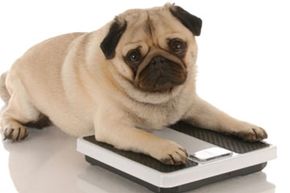 “Is your pooch too pudgy for his own good? iStockphoto/Thinkstock
“Is your pooch too pudgy for his own good? iStockphoto/Thinkstock
We all know that carrying extra weight isn’t healthy for humans; it contributes to such health problems as heart disease and diabetes. Did you know that the same goes for dogs? Obesity is the most common canine disease in the United States, occurring in up to 25 percent of the population. Chubby dogs are also more likely to develop other serious conditions like joint problems, infections, skin disease and even certain cancers.
Once a dog is overweight, it can be difficult to get him to lose. So the best thing for your dog is not to let him gain a lot of weight in the first place. Older dogs, with decreased activity levels and slower metabolisms, are more likely to put on weight. Some breeds are also predisposed to weight gain, such as Labrador retrievers. Keeping dogs healthy and trim works the same way as it does with people: They should only eat enough food to maintain the right body weight and get regular exercise.
To determine whether your dog is too heavy, stand over him and check for a waist — a visible indentation behind his ribs. Then give him a hands-on test. Can you feel his ribs? They shouldn’t be sticking out, but you should be able to find them easily through a layer of skin and muscle. If all you feel is rolls of fat, it’s time to work with your veterinarian to develop a diet and exercise plan for your pet.
A veterinary checkup will ensure your dog doesn’t have any health problems that could be contributing to his weight. It can also show whether he is healthy enough to increase his activity level and make changes to his diet. Your vet will advise you on the safest rate of weight loss; losing too much weight too fast can be dangerous. Monitor your dog’s progress with weekly weigh-ins, either at the veterinarian’s office or at home.
Read on to learn about the best way to feed and exercise your dog to get him healthy.
Doggie Bootcamp
Don’t change your dog’s food without discussing it with your veterinarian first. Diet changes, especially sudden ones, can make your dog sick. His regular food may be fine for him; he just needs less of it. Many people misunderstand or don’t pay attention to the feeding guidelines on their dog’s food. And even if you have been following the guidelines diligently and measuring his food, it may not be the right amount for your dog. Your vet can advise you how much to feed him.
You may also need to change how often you feed your dog. Most dogs do better with scheduled mealtimes, rather than leaving out food for them all day. If your pup is used to eating often, try feeding him several smaller meals. Avoid giving him table scraps. To keep his diet on the right track, offer food only at mealtimes. If you can’t resist giving treats, offer pieces of fruit (such as apples or bananas) or vegetables (like carrots or broccoli). They’re low in calories, and dogs love them.
Since overweight dogs are also out of shape, an exercise program must be started slowly. Begin with short walks and work up to longer ones. Once your pooch has lost some weight and built up his stamina, you can intersperse periods of jogging or running. Be cautious about exercising him in hot weather. Go out early in the morning or in the evening, when it’s cool, and stop before your dog shows signs of exhaustion, such as panting. Your natural cooling system is better than your his (you can sweat; but he can’t), which means you can exert yourself heavily for longer periods without overheating. Dogs will try to keep up with their owners even when they’re overheated, so it’s up to you to recognize when it’s time to stop.
Your dog didn’t gain weight overnight, so it’ll take some time to get him down to a normal weight. It may not be easy, but getting him healthy can add years to his life.
Lots More Information
Related Articles
- Home Remedies for Dogs With Porcupine Quills and Foxtails
- Home Remedies for Dogs With Sore Paws and Sunburn
- Home Remedies for Dogs With Worms
Sources
- ASPCA. "Overweight Dogs." ASPCA. 2011. (June 17, 2011)http://www.aspca.org/pet-care/dog-care/overweight-dogs.aspx
- Eldredge, Debra M., et al. "Dog Owner’s Home Veterinary Handbook." John Wiley and Sons. 2007.
- Nash, Holly. "Preventing Dog Obesity." Doctors Foster and Smith Pet Education. 2011. (June 17, 2011)http://www.peteducation.com/article.cfm?c=2+1659&aid=692
- Remillard, Rebecca. "Obesity in Dogs." Pet Place. 2011. (June 17, 2011)http://www.petplace.com/dogs/obesity-in-dogs/page1.aspx



























